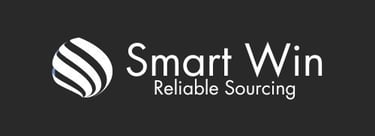Understanding Minimum Order Quantities (MOQs) When Sourcing from China
Minimum order quantity (MOQ) plays a key role in sourcing from China. Learn how to navigate MOQs, optimize costs, and build better supplier relationships.
2/9/20257 min read
![[Understand MOQs] Minimum Order Quantities When Sourcing from China](https://assets.zyrosite.com/cdn-cgi/image/format=auto,w=1024,h=434,fit=crop/YNqro9jB1VIg6bzd/cardboard-boxes-conveyor-belt-warehouse-ALp7N4zEoZfOXJ9N.webp)
![[Understand MOQs] Minimum Order Quantities When Sourcing from China](https://assets.zyrosite.com/cdn-cgi/image/format=auto,w=375,h=366,fit=crop/YNqro9jB1VIg6bzd/cardboard-boxes-conveyor-belt-warehouse-ALp7N4zEoZfOXJ9N.webp)
Sourcing products from China can be a game-changer for your business. The sheer scale and manufacturing prowess of Chinese suppliers offer the potential for incredible cost savings and a wider range of product options. However, navigating the world of Chinese manufacturing comes with its own set of unique challenges, and one of the most significant hurdles for many businesses – especially smaller ones – is understanding and managing Minimum Order Quantities (MOQs). I've been helping businesses navigate these waters for years, and trust me, knowing the ins and outs of MOQs can make or break your sourcing success.
MOQs are the minimum quantity of a particular product that a supplier is willing to produce in a single order. Think of it as the supplier's way of ensuring it's worth their while to fire up the production line. But what seems simple on the surface can quickly become a complex issue with significant implications for your budget, inventory, and overall sourcing strategy.
This article isn't just about defining MOQs; it's about empowering you with the knowledge and strategies you need to confidently approach Chinese suppliers, negotiate favorable terms, and make informed decisions that will benefit your bottom line. I'll share my own experiences and practical insights that can help you turn potential MOQ challenges into opportunities for growth.
By understanding and effectively managing MOQs, your business can indeed grow by connecting with trusted Chinese manufacturers, ensuring product quality and managing efficient shipping with Smart Win.
Table of Contents
What is a Minimum Order Quantity (MOQ)
How Do MOQs Affect Small Businesses?
Negotiation Strategies
Factors Determining MOQs Set by Suppliers
Meeting MOQs Without Negotiating Down
MOQs Impact on Inventory Management
Risks of Ordering Large Quantities to Meet MOQs
Calculating Optimal Order Quantity
Role of Sourcing Agent in Managing MOQs
Additional Resources on Minimum Order Quantities
Conclusion
What is a Minimum Order Quantity (MOQ)
Defining the Term
At its core, a minimum order quantity (MOQ) represents the smallest number of units a supplier is willing to produce in a single order. It's the supplier's baseline for profitability, ensuring that the production run is economically viable given their setup costs and operational expenses. Without MOQs, many suppliers wouldn't be able to cover their expenses or generate a reasonable profit margin.
MOQs very greatly depending on a variety of circumstances, a supplier selling simple t-shirts might have an MOQ of 500 pieces, whereas a supplier of custom electronics might have an MOQ of 100 pieces.
Why Suppliers Impose MOQs
Suppliers impose MOQs for a variety of reasons, all centered around profitability and efficiency. Setting up a production line requires time, labor, and resources. MOQs allow suppliers to:
Cover Setup Costs: Each production run involves costs for tooling, machine setup, and quality control.
Maximize Efficiency: Larger production runs allow for economies of scale, reducing the cost per unit.
Manage Inventory: MOQs help suppliers minimize their own inventory holding costs by ensuring they produce goods in quantities that are likely to be sold.
Common Misconceptions About MOQs
There are a few common misconceptions floating around about MOQs. One is that MOQs are inflexible – that is, they are set in stone. While some suppliers may be firm on their MOQs, many are open to negotiation, especially if you can demonstrate the potential for a long-term, mutually beneficial partnership. Another misconception is that lower MOQs always translate to better deals. While that might be true in some cases, remember that lower MOQs often come with higher per-unit costs. It's a balancing act!
How Do MOQs Affect Small Businesses?
Challenges Faced by Small Businesses
For small businesses, MOQs can present a significant barrier to entry when sourcing from China. Smaller companies often lack the capital to invest in large order quantities and may not have the storage capacity to handle them. This can limit their ability to offer a diverse product range or test new products without taking on excessive risk. Statistics show that over 65% of small businesses struggle with meeting MOQs, leading to missed opportunities and slower growth.
Strategies for Overcoming MOQ Barriers
Fortunately, there are several strategies small businesses can employ to overcome MOQ barriers:
Negotiate: Don't be afraid to negotiate! Building rapport with your supplier and explaining your business goals can often lead to more flexible terms.
Combine Orders: Collaborate with other businesses to combine orders and meet MOQs collectively.
Consider Multiple Products: Include a variety of products in your order to reach the MOQ threshold.
Work With a Sourcing Agent: As a China sourcing agent, Smart Win can connect you with trusted Chinese manufacturers
Opportunities for Small-Scale Sourcing
While MOQs can be challenging, they also present opportunities. Successfully navigating MOQs requires careful planning, efficient inventory management, and strong supplier relationships, all of which can contribute to a more resilient and profitable business.
Negotiation Strategies
Best Practices for Negotiation
Negotiation is key to navigating MOQs successfully. Always approach negotiations with a clear understanding of your own needs and limitations, as well as a willingness to compromise. Transparency, customer focus, and a deep understanding of the local market is what makes a good sourcing agent at Smart Win.
Building Rapport with Suppliers
Building a strong relationship with your supplier is essential for long-term success. Treat your suppliers with respect, communicate clearly, and be responsive to their needs. Suppliers are more likely to be flexible with MOQs for businesses they trust and value.
Tactics for Reducing MOQs
Here are a few tactics you can use to try and reduce MOQs:
Explain Your Business Goals: Communicate your vision for long-term growth and how you plan to scale your orders over time.
Offer a Premium: Be willing to pay a slightly higher per-unit price for smaller order quantities.
Commit to Future Orders: Assure the supplier that you plan to place repeat orders in the future.
Suggest Alternative Materials or Specifications: Sometimes, altering the product specifications can reduce production costs and lower MOQs.
Factors Determining MOQs Set by Suppliers
Production Costs
One of the primary drivers of MOQs is production cost. Suppliers need to cover their expenses for labor, materials, and overhead. Higher production costs often lead to higher MOQs.
Material Costs
The cost of raw materials also plays a significant role in determining MOQs. If a supplier needs to purchase a large quantity of materials upfront, they may set a higher MOQ to ensure they can use those materials efficiently.
Supplier Capacity and Overhead
A supplier's production capacity and overhead expenses also influence MOQs. Suppliers with limited capacity may set higher MOQs to maximize their output, while those with lower overhead costs may be more flexible with smaller orders.
Meeting MOQs Without Negotiating Down
Combining Orders with Other Buyers
One strategy for meeting MOQs is to combine orders with other businesses. By pooling resources and sharing the order quantity, you can reach the required MOQ without having to shoulder the entire burden yourself.
Ordering Multiple Products
Another approach is to order a variety of products from the same supplier to meet the MOQ threshold. This can also help you diversify your product offerings and appeal to a wider customer base.
Using a Sourcing Agent
Sourcing agents often have established relationships with multiple suppliers and can negotiate better terms, including lower MOQs. They can also help you find suppliers willing to accommodate smaller orders or combine your orders with those of other clients.
MOQs Impact on Inventory Management
Inventory Planning Strategies
MOQs have a direct impact on inventory management. Businesses need to carefully plan their inventory levels to ensure they can sell the ordered quantities without incurring excessive storage costs or product obsolescence.
Managing Storage Space
Ordering large quantities to meet MOQs requires adequate storage space. Consider the costs associated with renting or leasing warehouse space and factor them into your overall sourcing strategy.
Minimizing Waste and Obsolescence
Efficient inventory management is crucial for minimizing waste and obsolescence. Implement strategies such as "just-in-time" inventory management and demand forecasting to ensure you're not holding onto excess inventory for too long.
Risks of Ordering Large Quantities to Meet MOQs
Financial Risks
Ordering large quantities to meet MOQs ties up capital and increases financial risk. If your products don't sell as expected, you could be stuck with unsold inventory and significant financial losses.
Market Demand Risks
Market demand can fluctuate, and ordering large quantities based on current demand can be risky. If demand declines, you could be left with excess inventory that is difficult to sell.
Storage and Logistics Risks
Storing and managing large quantities of inventory presents logistical challenges. You need to ensure you have adequate storage space, efficient handling processes, and effective transportation arrangements.
Calculating Optimal Order Quantity
Economic Order Quantity (EOQ) Formula
The Economic Order Quantity (EOQ) formula helps businesses determine the optimal order quantity by balancing ordering costs and holding costs. This formula can be a valuable tool for minimizing total inventory costs.
Impact of MOQ on EOQ
When calculating the optimal order quantity, it's important to consider the impact of MOQs. If the calculated EOQ is below the supplier's MOQ, you'll need to adjust your order quantity to meet the minimum requirement.
Balancing Costs and Risks
Determining the optimal order quantity involves balancing costs and risks. Consider factors such as storage costs, obsolescence risks, and market demand fluctuations to make informed decisions about order quantities.
Can a sourcing agent help with MOQs?
How Sourcing Agents Negotiate MOQs
Yes! As customer centric expert with Smart Win, a sourcing agent possesses local market knowledge and negotiation skills to effectively work with suppliers and aim for lower MOQs that align with your business objectives.
Benefits of Using a Sourcing Agent for Small Orders
Sourcing agents specialize in finding suppliers that can accommodate smaller order sizes, thus avoiding the stress of having large order volumes.
Finding Suppliers Willing to Accommodate Small Businesses
Sourcing agents also have already existing supplier relationships, meaning that they can connect you to suppliers who work and are willing to accept small order quantities.
Conclusion
Navigating the world of Minimum Order Quantities (MOQs) when sourcing from China can be challenging, but it's also an essential part of doing business. By understanding what MOQs are, why suppliers impose them, and how to negotiate and manage them effectively, you can unlock incredible opportunities for cost savings and product diversification.
Whether you're a small business just starting out or a larger company looking to optimize your sourcing strategy, remember that knowledge is power. Arm yourself with the information and strategies outlined in this article, and don't hesitate to seek the guidance of a trusted sourcing agent. With the right approach, you can turn MOQs from a barrier into a stepping stone for growth and success in the dynamic world of Chinese manufacturing.
Our Address
No.202 Huanshi West Rd, Yuexiu District Guangzhou, China
Contact Us
Working hours
Monday - Saturday
9:00 - 18:00
( Beijing Standard Time )
Smart Win Services


Company


